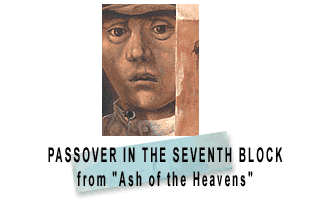 |
"Nowhere
in the world was worse than Auschwitz, except Birkenau. And the seventh
block was worst of all."[1] |
Anyone
who took his time was whipped-on the head, in the face. People streamed
out of the other trucks. Women and children too. Everyone had to move
on the double. They came to a wall. There were clerks sitting there. Germans.
And armed soldiers standing along the wall. Above the gate was a giant
slogan: "ARBEIT MACHT FREI."[2]
"Men
to the right! Women and children to the left!" Some of the scurrying
procession fell to the ground and were trampled on. The lines divided
in different directions. It was impossible to understand the reason for
it. And there was no time to pay heed to what was happening. In that winding
stream they seemed not even to feel the pain of separation.
Out of
the corner of his eye Sternheim saw mothers shudder as they hugged their
children and men call out to them with a wave of the hand, "Good-bye.
See you at the station."
Even
as the frightening chorus of commands fell like shadows across their ears,
they continued to examine the unfolding sights of the camp. Reinforced
blocks of huts in reasonable condition. A pattern of roads. Everything
perfectly clean and well ordered. The impression was of a busy, well-organized
beehive. Dr. Sternheim, who was driven to distraction by anything illogical,
found some consolation
in the appearance of the place: Auschwitz was a camp designed for mass
labor. The line of men went through the gate, ran past the wall, and arrived
at an empty square. Sternheim dropped, exhausted. The moment's respite
ended and Eli did as ordered and added their personal belongings to the
general pile, lending his father support as they moved forward. They were
standing now in groups of five and straightened the ranks. Armed guards
moved among the ranks and marked off five groups of five. These were marched
off to one of the blocks. Eli prayed their turn would come quickly. His
father's body hung slack, reaching for the ground. Eli held him without
the guards noticing. But they stood waiting more than an hour and his
strength was running out.
Eventually
their turn came and they were marched off between the huts. As they crossed
a wide avenue they happened to meet some veteran prisoners. At the risk
of a whipping from the guards, Eli turned toward the men passing by and
pressed them with questions. The camp dwellers made no answer, no one
stopped for him. He could see they were busy with some task. Some were
carrying food containers and some blocks of wood. Tottering and running.
They called out monosyllables to each other, as if they spoke some secret
language. They all wore peakless caps. He now saw the camp as unending.
A camp within a camp within a camp within a camp, crisscrossed and surrounded
by electric fences. They marched forever.[3]
Sternheim's
face had turned green and Eli could not understand how his father could
still march with his eyes shut. Eli's eye were open but he could hardly
breathe and a cold sweat bathed the back of his neck.
They
passed through gates and moved between rows of SS carrying Schmeissers.
The salt from his sweat seared his neck, his whole brain seemed to have
turned into a block of salt. Strange, it was just at this moment that
sights from the farm came unbidden to his mind, trivial incidents during
his training. There was a large iron bar hanging from a post in the middle
of the farm camp, which served as a bell. They would ring it for meals
and meetings. He asked them to get rid of the spine-chilling thing. But
the youth leader said this was the way things were done on a kibbutz in
Palestine and nothing from Palestine could be alarming, only heartwarming.
Three shots were heard and a single cry.
 |
[1]
AUSCHWITZ-BIRKENAU was a death combine, the largest Nazi concentration
camp and death camp. It was set up in April 1940, in Galicia, west
of Krakow and south of Sosnowiec and Katowice in Silesia. The first
camp held Polish political prisoners. The second camp was called
Birkenau (after the nearby Polish village). The commander of the
camp, Rudolph Hoess, was assigned the main role in implementing
the Final Solution, that is, the physical annihilation of the Jewish
people. In September 1941, the first experiments with the gas Zyklon
B were carried out. The first victims were goo Soviet prisoners
of war. In January 1943, the gas chambers, disguised as showers,
and four ovens (the crematorium) for incinerating the bodies (instead
of burying them) were built. Already in March 1942, the Nazis had
begun the mass destruction of Jews at Auschwitz-Birkenau. Trains
arrived from all parts of Europe, loaded with consignments of Jews
for slaughter: from Poland, Slovakia, France, Italy, Holland, Belgium,
Yugoslavia, Norway, Germany, Latvia, Austria, Greece, and North
Africa. An underground sabotage movement was formed in the camp.
With the retreat of the German army, Himmler gave orders for the
gas installations to be dismantled and all traces of the slaughter
to be erased (November 1944). More than a million Jews, Gypsies,
and members of other nations met their deaths in Auschwitz. On January
27, 1945, the Red Army liberated the camp and the 6,750 Jews and
others who were left there. [back]
[2]
"ARBEIT MACHT FREI" (German): "Work makes you free."
The cynical slogan of deceit that flew above the gate of the Auschwitz
death camp. [back]
[3]
Someone will say it lasts but a year,
Three times four months;
I say those are days and nights
That are endless
Every day-twelve hours, Every night-seven hundred minutes,
Every minute-sixty seconds,
Each second with its load of pain and suffering.
(Written in Polish by an unknown Jewish girl and found lying around
at Auschwitz) [back]
|
SCROLLS
Introduction
|



